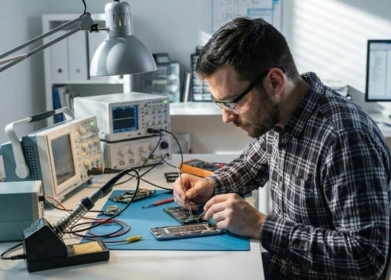Is a Master’s Degree in Aerospace Engineering Worth It?
Considering a Master’s in Aerospace Engineering? Explore the benefits, challenges, and career impacts to decide if it’s worth the investment for your future.
Jennifer Sheriff

Aerospace engineering is a field at the forefront of technology and innovation, driving advancements in aviation, space exploration, and defense. For those already holding a Bachelor’s degree in aerospace engineering or a related field, the question arises: Is pursuing a Master’s degree in aerospace engineering worth it?
Let’s explore the benefits, challenges, and potential returns of earning a Master’s degree so that you can make an informed decision about your educational and career path.
Understanding the Value of a Master’s Degree
A Master’s degree in aerospace engineering represents an advanced level of education that builds upon the knowledge gained during undergraduate studies. It typically involves specialized coursework, research opportunities, and a focus on advanced engineering concepts. Here’s how a Master’s degree can impact your career:
Specialization and Expertise
Advanced Knowledge: A Master’s program allows you to specialize in areas such as spacecraft design, propulsion systems, avionics, or aerospace materials. This specialized knowledge can set you apart from others in the field and position you for roles that require in-depth expertise.
Research Opportunities: Many Master’s programs include research components where you can work on cutting-edge projects and contribute to advancements in aerospace technology. This hands-on experience can be valuable for those interested in research or academic careers.
Industry Relevance: Specialized knowledge and research experience can make you a more attractive candidate for advanced roles in the aerospace industry, including positions in research and development, project management, and technical leadership.
Career Advancement
Higher-Level Positions: A Master’s degree can open doors to higher-level positions that may not be accessible with just a Bachelor’s degree. These roles often involve greater responsibility, higher salaries, and opportunities to lead complex projects.
Increased Earning Potential: Advanced degrees often correlate with higher earning potential. According to various industry reports, professionals with a Master’s degree can earn significantly more than those with only a Bachelor’s degree.
Career Transition: If you’re looking to transition into a new area within aerospace engineering or shift into a different engineering discipline, a Master’s degree can provide the additional qualifications and expertise needed for a successful transition.
Academic and Research Careers
Teaching Opportunities: A Master’s degree can serve as a stepping stone to academic careers, including teaching positions at universities. For those interested in academia, a Master’s degree is often a prerequisite for pursuing a Ph.D. and engaging in higher education.
Research Institutions: A Master’s degree can qualify you for roles in research institutions, where you can contribute to groundbreaking research and development projects in aerospace engineering.
Publication and Networking: Master’s programs often involve publishing research findings and attending conferences. These activities can help you build a professional network and establish a reputation in the field.
Professional Development
Skill Enhancement: A Master’s program provides opportunities to enhance your technical skills, such as advanced simulation techniques, computational modeling, and systems integration. These skills are valuable for tackling complex engineering problems.
Project Management: Many Master’s programs include coursework or projects related to project management and leadership. These skills can be beneficial for managing large-scale projects and leading teams in the aerospace industry.
Innovation and Creativity: Advanced coursework and research projects encourage innovative thinking and problem-solving. This fosters creativity and the ability to develop new solutions to engineering challenges.
Challenges and Considerations
While a Master’s degree in aerospace engineering offers numerous benefits, it’s essential to consider the challenges and factors that may influence your decision:
Time and Financial Investment
Program Duration: A Master’s degree typically requires two years of full-time study, although part-time options are available. Consider whether you can commit to the time required for completing the degree while managing other responsibilities.
Cost: Graduate programs can be expensive, and it’s important to evaluate the return on investment. Consider tuition costs, potential financial aid, and the long-term financial benefits of earning a Master’s degree.
Opportunity Cost: Pursuing a Master’s degree means spending time away from the workforce. Evaluate whether the potential career benefits justify the opportunity cost of not working during this period.
Program Quality and Fit
Accreditation and Reputation: Ensure that the Master’s program you choose is accredited and has a strong reputation in the aerospace industry. Research the faculty, research opportunities, and industry connections to ensure the program aligns with your career goals.
Specialization and Focus: Different programs offer varying specializations and areas of focus. Choose a program that aligns with your interests and career aspirations to maximize the value of your degree.
Research Opportunities: If research is a key component of your career goals, select a program with strong research facilities and opportunities for collaboration with industry partners.
Career Goals and Industry Trends
Industry Demand: Research current trends and demand in the aerospace industry. Consider whether a Master’s degree will provide a competitive edge in your specific area of interest and whether the investment aligns with industry needs.
Long-Term Goals: Reflect on your long-term career goals and whether a Master’s degree aligns with those objectives. Consider how the degree will impact your career trajectory and opportunities for growth. Remembering your reasons for pursuing the degree will help you stay motivated when the going gets tough.
Alternatives to a Master’s Degree
If you’re uncertain about pursuing a Master’s degree, consider alternative options:
Certifications and Professional Development
Specialized Certifications: Certifications in specific areas of aerospace engineering, such as avionics or propulsion systems, can enhance your skills and qualifications without the time and financial commitment of a Master’s degree.
Professional Development Courses: Short courses and workshops in emerging technologies or advanced engineering techniques can provide valuable knowledge and skills relevant to your career.
Work Experience and On-the-Job Learning
Industry Experience: Gaining experience through work in the aerospace industry can provide practical knowledge and skills. Many employers value hands-on experience and may offer opportunities for advancement based on performance and expertise.
On-the-Job Training: Some employers offer training and development programs that can help you acquire new skills and advance your career without pursuing a Master’s degree.
Level Up with an Aerospace Engineering Degree
Deciding whether to pursue a Master’s degree in aerospace engineering involves weighing the potential benefits against the challenges and considerations. A Master’s degree can provide advanced knowledge, specialization, and career opportunities, but it also requires a significant time and financial investment.
If you’re passionate about aerospace engineering and committed to advancing your career, a Master’s degree can be a valuable asset. It can open doors to higher-level positions, research opportunities, and academic careers, enhancing your skills and earning potential. However, it’s essential to carefully evaluate your career goals, financial situation, and program options to make an informed decision.
Ultimately, the value of a Master’s degree in aerospace engineering depends on your individual career aspirations and how the degree aligns with your long-term objectives. By considering these factors and exploring alternative options, you can determine whether pursuing a Master’s degree is the right path for you.
Related Articles

Unlocking Your Future: The Tangible Benefits of an Electrical Engineering Degree
From the smartphone in your pocket to the power grid that lights your home, electrical engineering is the invisible force shaping the modern world. It’s a discipline that translates the abstract principles of physics into the tangible technologies we rely on every day.For those considering this dynamic field, the benefits extend far beyond a challenging curriculum; a degree in Electrical Engineering (EE) is a key that unlocks a future of innovation, impact, and unparalleled opportunity.
Read More
How to Pivot Your Career: The Masters in Mechanical Engineering Roadmap
The core principles of mechanical engineering are timeless, yet their applications are constantly expanding. The rise of automation, the urgency of climate change, and the explosion of data have created new frontiers where mechanical engineers are uniquely positioned to make a significant impact. Staying relevant and seizing these opportunities often requires a deeper, more specialized skill set than what an undergraduate degree can provide.
Read More
The Best Online Engineering Degrees for Explosive Career Growth & High ROI
The rise of accredited, rigorous online engineering degrees has created an unprecedented opportunity to gain elite skills, accelerate career growth, and achieve a remarkable return on investment—all on your own terms. This article is designed to cut through the noise. We will explore the specific online engineering disciplines that offer explosive career growth, delve into what a high ROI truly means in this field, and provide a clear roadmap for selecting and financing a program that aligns perfectly with your ambitions.
Read More